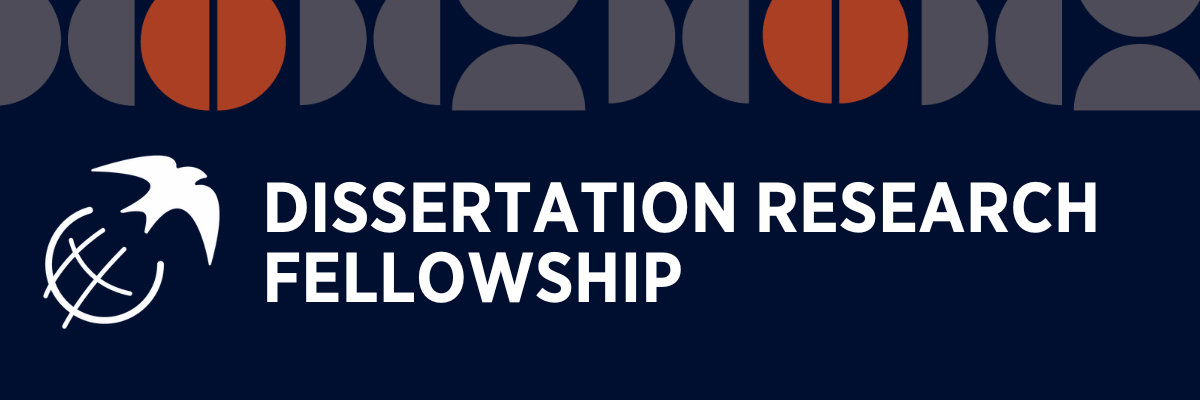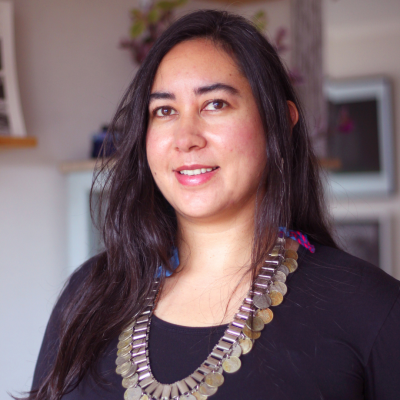The Gladstein Family Human Rights Institute will fund one $5,000 dissertation research fellowship for the 2026-2027 academic year to support primary research activities. Applicants must have successfully completed their qualifying exams and dissertation prospectus by time of application.

2025 Dissertation Research Fellowship Recipient

Catalina Alvarado
Ph.D. Candidate, Anthropology Department
“Mapuche Creative Spirits: Collective Healing of the Colonial Trauma of Wallmapu”
Catalina Alvarado-Cañuta is a Fulbright scholar of Mapuche origin who is currently a PhD candidate in Medical Anthropology at the University of Connecticut. She began her specialization in the field as a master's student at the Centro de Investigaciones y Estudios Superiores en Antropología Social (CIESAS), Mexico, where she obtained her degree in Social Anthropology. Catalina has worked in public service as a manager of health programs for the indigenous population in Chile, and has conducted research in this area. Prior to studying in the United States, Catalina worked as an academic at universities in Chile, where she focused on issues related to culture, social identities, and public policy.
Alvarado-Cañuta’s main focus is on colonial trauma and the processes of collective healing of indigenous peoples, and indigenous art as a decolonial methodology. Her latest co-authored work is the chapter “Trig Metawe: Restoring the cracks of dispossession for Küme Mongen,” in which she and Mapuche artist Francisco Huichaqueo analyze the plundering of Mapuche archaeological heritage (they call them prendas de memoria) distributed among museums in Chile and around the world as part of the processes that generate Colonial Trauma and how its possible restitution or accompaniment to Mapuche archaeological heritage contributes to the restitution of the collective well-being of Mapuche people. Alvarado Cañuta is an activist scholar who maintains family ties with her Mapuche community in Bollilco, Ercilla, where she is the community coordinator for Mapuche heritage restitution issues. She is currently a member of the Buen Vivir and Collective Healings Initiative, a research group that uses participatory action methodologies led by Dr. César Abadía-Barrero at the University of Connecticut. Catalina has recently taken on the role of Co-Coordinator of the Abiayala Working Group section of the Native American and Indigenous Studies Association (NAISA).
Former Recipients
2024
- Madeline Baird
Ph.D. Candidate, Department of Anthropology
"Embodied Borders: Navigating Transit Migration to the U.S.-Mexico Border"
2023
- Emily Loveland
Ph.D. Candidate, School of Social Work
"Reframing The Supplemental Nutrition Assistance Program (SNAP): Applying a Human Rights Framework to Federal Food Assistance in the United States"
2022
- Madri Hall-Fau
Ph.D. Candidate, School of Social Work
"The Role of Devolution in Social and Economic Rights Fulfillment: The Case of Temporary Assistance for Needy Families in Connecticut"
Eligibility Criteria
- Open to University of Connecticut doctoral students (ABD) in all disciplines from any UConn campus.
- Applicants must have successfully defended a dissertation prospectus by time of application.
- Students may receive this award once during their tenure in the Ph.D. program.
- In any given year, a student may receive either the Dissertation Research Fellowship or the Dissertation Writing Fellowship, but not both.
How to Apply
The proposal process encourages doctoral students to model and meet the requirements for succeeding in competition for funds by defining a problem, a research project, and a timeline for completing the dissertation research.
Access the application via Microsoft Forms. The application requires the following materials:
- Narrative description of the proposed research (three pages, double spaced, 12 point font) that contains the following:
- Project Rationale: Please describe your reasoning for undertaking this research project and the impact you believe your project will have on understandings of, or policies affecting, human rights.
- Impact: Identify the expected contribution your research will make to the field of human rights.
- Methodology: Explain how you will conduct your research. Be explicit in describing the types of methods employed and the advantage of using these particular methods.
- Anticipated budget and budget justification (Download the Anticipated Budget and Budget Narrative Template)
- Detailed timeline for the completion of your dissertation (no more than one page), describing precisely where you are in your research, what remains to be done, and when you will do it.
- Current CV
- Unofficial transcript
- Short statement from your advisor/dissertation supervisor that addresses the status of your dissertation research and your eligibility for the award. This should not be an evaluative statement about your actual dissertation research. The statement should be submitted electronically via https://forms.office.com/r/uNhcjRgDsi.
Application Deadline for 2026: April 3rd
Evaluation of Applications
The dissertation project should demonstrate overall excellence with a focus on human rights issues, understood broadly. The dissertation research is expected to make a significant contribution to the scholarly, policy or practice literature in human rights. Priority will be given to applications that evidence human rights coursework and/or prior substantive human rights engagement.
Students are encouraged to use the award as support for activities related to dissertation research, including data collection and travel.
All proposals will be reviewed and ranked by a multidisciplinary review committee chaired by the associate director of the Gladstein Family Human Rights Institute and comprised of members of the Gladstein Human Rights Committee. The number of grants will depend on the number of applications ranked ‘excellent’ by the review panel.